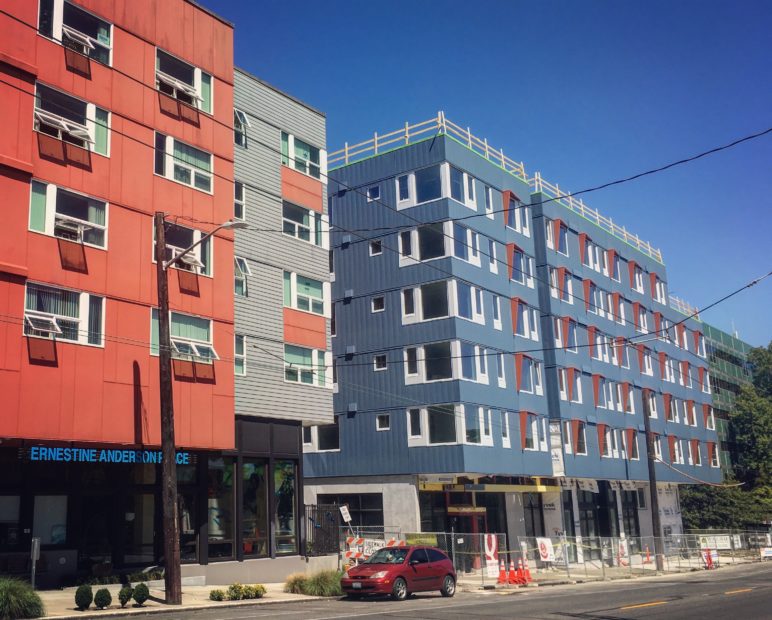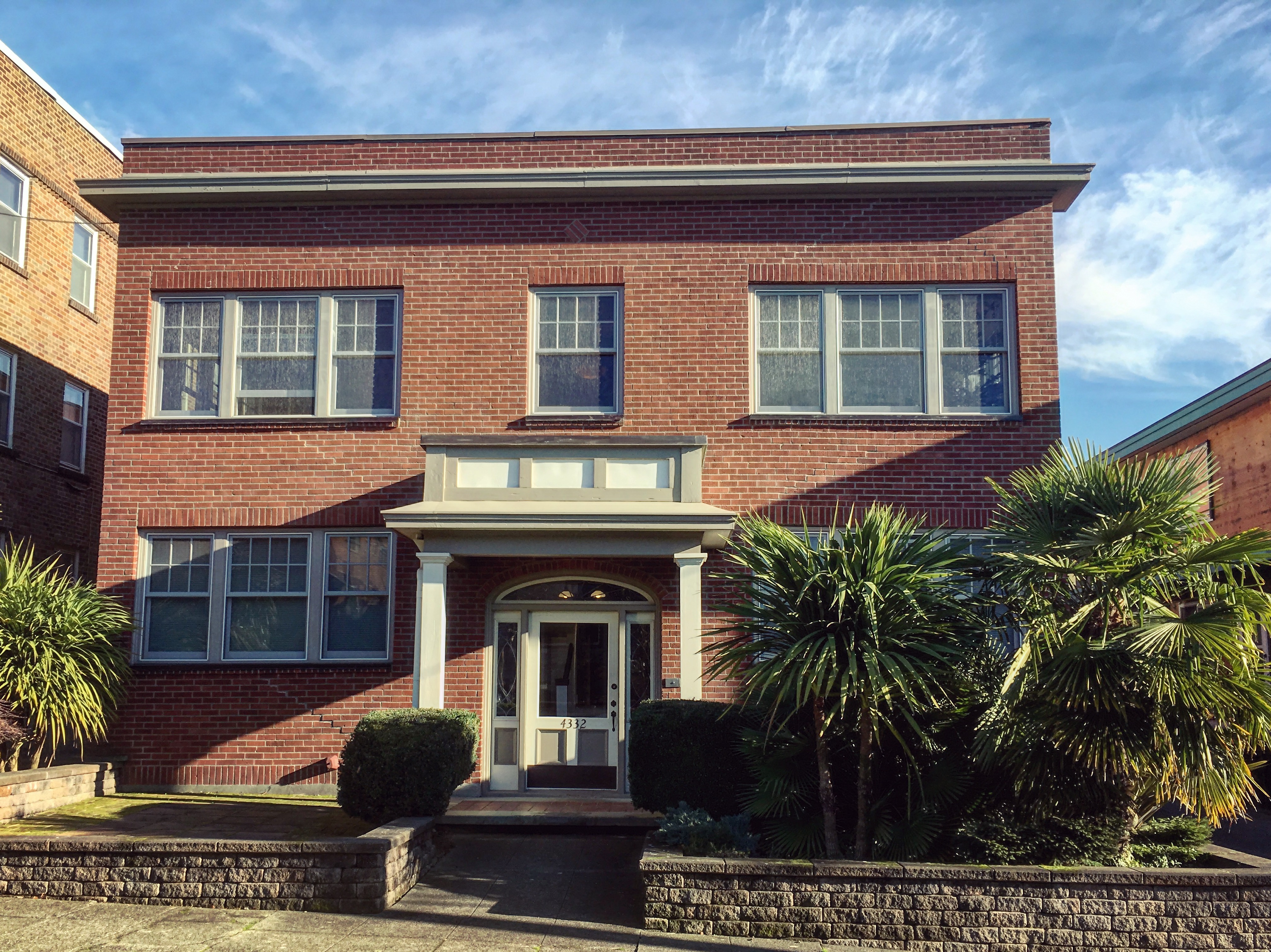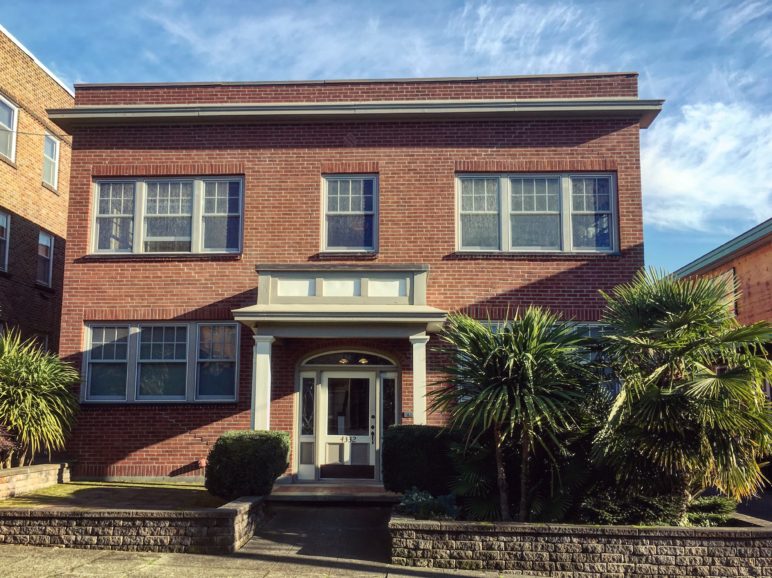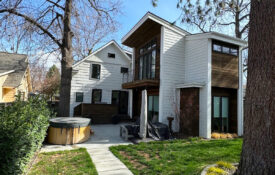Washington has a pioneering opportunity to enact a coordinated package of housing policies that calls on cities to share the responsibility.
Across Cascadia, high rents and home prices are leaving people behind. Local governments struggle to meet this massive challenge of politics and funding. In response, this year Washington state legislators are stepping up with a remarkably comprehensive suite of housing bills.
Tackling a housing affordability crisis calls for three main fixes: more homes; more funding for affordable homes; and more tenant protections. Impressively, Washington lawmakers have proposed bills that do all three.
Alone, each of these strategies is insufficient; together, they form a balanced approach. In growing cities without enough homes for all the people who want them, building more homes of all shapes and sizes holds down average rents and prices, and that helps everyone. Increased funding for subsidies delivers more homes to those who still can’t afford what the market can provide. And tenant protections safeguard those with the least housing security—renters—insulating them from rapid change.
Washington has a pioneering opportunity to enact a coordinated package of housing policies that calls on cities throughout the state to share the responsibility. Here’s a rundown.
MORE HOMES
The fundamental way to keep rents and prices under control in housing-short cities is to relax rules that stymie homebuilding. Although that’s simple in concept, it’s politically tricky. Local processes are all too often co-opted by a vocal minority of homeowners opposed to change. To help overcome that dysfunction, Washington legislators have proposed several bills that would curtail local constraints on housing:
Reduce barriers to accessory dwellings (HB 1797)
Sightline has been working closely with legislators to develop a bill to spur the production of modest homes like basement or garage apartments in neighborhoods of detached houses on big yards. Based on Sightline’s research since 2013, the bill would prohibit restrictions commonly imposed by cities that make it difficult for people to construct accessory dwelling units (ADUs) on their lots. It would require cities with population over 2,500 to:
- allow two ADUs per lot—one attached ADU that’s part of the main house and one detached ADU that’s a stand-alone structure like a backyard cottage
- remove any quotas for off-street parking spaces for ADUs
- eliminate any requirement for the property owner to live on site
- relax various size constraints and limit utility connection and impact fees
Re-legalize missing middle homes (SB 5769)
This bill would expand lower cost housing options in high-opportunity neighborhoods currently restricted to expensive, detached houses. It would mandate that cities allow “missing middle” homes—duplexes, triplexes, townhouses, and small apartment buildings—on lots within a quarter-mile of parks, schools, hospitals, transit, and zones that already allow multifamily housing or commercial uses. It would also mandate that cities zone all of their residential land located within an urban growth area to a minimum six dwellings per acre.
Expand capacity for new homes (HB 1923)
This bill includes a variety of measures. Most notably, it would require cities with population over 10,000 to take two or more of the following actions by 2022 or risk losing state funding for public facilities and transportation:
- Allow 50 dwellings per acre on land within one quarter-mile of fixed-guideway transit
- Permit duplexes, triplexes, or courtyard apartments in single-family zones
- Cap parking quotas at one space per two dwellings in multifamily zones within one half-mile of fixed-guideway transit
- Authorize accessory dwellings in all single-family zones
- Carry out a local plan for growth known under state law as a “planned action”
- Adopt all allowed exemptions from state environmental review of residential construction
The bill would also reduce or eliminate parking quotas for affordable housing near transit; prohibit cities from charging extra impact fees on multifamily housing; establish exemptions from legal appeals on transportation environmental analysis; and permit supportive housing wherever multifamily housing is allowed.
Allow more homes near light rail stations (SB 5424)
This bill is intended to make sure the region leverages its huge investment in light rail by maximizing housing near future stations. It would require cities in which Sound Transit locates a station for its ST3 program to zone the residential land within a half mile of the station for 150 homes per gross acre. That’s a density typical of eight to ten story apartments. Further, the bill would exempt any such rezones from appeals through either the Growth Management Hearings Board or State Environmental Policy Act, in order to stop obstructionist misuse of environmental laws.
Ease restrictions on tiny houses (SB 5382, SB 5383, and HB 1206)
Tiny houses are compact—typically 400 square feet or less—stand-alone homes with standard household utilities. They are usually portable, often with integrated wheels that allow them to be easily moved as trailers, and that portability has created regulatory ambiguities that can impede their construction.
- SB 5382 would authorize cities and counties to permit tiny houses as a form of accessory dwelling unit (ADU), providing an additional legalization path.
- SB 5383 would authorize cities and counties to permit “tiny houses with wheels to be collected together as tiny house villages,” and also allow them in mobile home communities.
- HB 1206 would establish a new definition for tiny home: “a dwelling designed for permanent occupancy that is 400 square feet or less in floor area excluding lofts.”
Fix the Condominium Liability Law (SB 5334/HB 1306)
This bill would stimulate the construction of condos to increase home ownership options for people who can’t afford a pricey detached house. The state’s condo defect liability law has helped cause a condo construction drought by encouraging frivolous lawsuits. The bill would tighten what qualifies as a warrantable defect, and it would more explicitly shield condo association board members from personal liability so they would be less inclined to file lawsuits just to protect themselves. A related bill, SB 1219, would exempt condos with seven units or fewer from the warranty provisions of the existing state law to reduce the liability burden on small-scale condo developments. (Note that these condo bills differ from the bills above in that they are fixing a broken state law, not a local government barrier.)

Located in Seattle’s Central Area, Ernestine Anderson Place (foreground) serves low-income seniors, and Abbey Lincoln Court (background) provides homes for families earning up to 60 percent of area median income. Photo by Dan Bertolet, used with permission.
MORE FUNDING FOR AFFORDABLE HOMES
Housing is expensive to build. A modest new apartment can cost more than $250,000. In Washington, a state with a highly regressive tax system, cities lack options to generate tax revenue with which to subsidize affordable housing. They often only need new state laws that authorize local assessment of taxes. Here are bills that would create new funding:
Redirect sales tax revenue to affordable housing (HB 1406/SB 5646)
This bill would authorize cities and counties to recapture 0.01 percent sales tax from the state’s currently assessed sales tax and use that revenue for acquiring, rehabilitating, or constructing affordable housing; smaller cities/counties could also put the funds toward renter assistance. Cities/counties could opt to bond against the future tax revenue to generate larger, near-term funds for affordable housing. The bill would also authorize cities/counties to enact a local levy for an additional 0.01 percent sales tax to be used for the same purposes. In 2017, Seattle generated about $26 billion in taxable sales, from which a 0.01 percent tax would capture $2.6 million per year, or twice that if the city also enacted a local levy.
Extend the multi-family tax exemption (SB 5363)
Under state law, cities can grant a property tax exemption on apartment buildings that offer 20 percent of their units at rents affordable to households earning 80 percent of the area median income. It’s an indirect way to use property taxes to fund affordable housing, because all other taxpayers pay a little more to cover the tax exemption’s forgone revenue. The current provision expires 12 years from building completion, at which point the subsidized homes return to market-rate rent. The bill would extend the expiration for another 12 years to keep homes in the program longer. The City of Seattle has permitted over 8,500 affordable homes through the tax exemption program since 1998.
A related bill, SB 5366, would allow every city in the state to take advantage of the property tax exemption, extending eligibility to smaller cities to which the current law does not apply.
Authorize real estate excise tax for affordable housing (HB 1219/SB 5195 and HB 1493/SB 5357)
A real estate excise tax (REET) is tax on real estate sales. Two REET bills would authorize cities to enact new flat rate REETs for the sole purpose of funding affordable housing: one proposes a 0.25 percent rate and the other a 0.5 percent rate. In 2016, City of Seattle analysts estimated that a 0.25 percent REET would annually raise $15-20 million in Seattle, or about $1 million in Edmonds, for example. The drawback of REETs is that they can raise home prices. To minimize that, Sightline recommends exempting new construction.
Make the REET progressive to fund affordable housing (HB 1921)
This bill would convert the state’s flat rate 1.28 percent real estate excise tax (REET) to a progressive rate and dedicate the resulting extra revenue to affordable housing. The proposed rate structure is:
- 0.75 percent for sales less than $500,000
- 1.28 percent for $500,000 – $1,500,000
- 2 percent for $1,500,000 – $7,000,000
- 3 percent for greater than $7,000,000
Seventy percent of the revenue exceeding what would have been raised under the existing flat rate REET would go to the state’s Housing Trust Fund, and the rest to the General Fund. In addition to providing more funding for subsidized housing, the bill would also help affordability by shifting the tax burden from lower to higher income buyers and sellers.
Increase the State Housing Trust Fund to $200 million
Note: this will be a budget request, not a bill. Washington’s Housing Trust Fund provides funding for affordable housing projects through a competitive application process, and since 1986 has invested $1 billion to help create 47,000 homes. In recent years, the state has allocated around $100 million per year to the Trust Fund. Doubling the funding would help address the growing shortage of affordable homes statewide.
MORE TENANT PROTECTIONS
In booming metros, surging rents put tenants at greater risk of losing their homes. Not only do renters have to worry about rents rising faster than paychecks, but when a real estate market gets hot, they have to worry about losing their rented home to renovation or redevelopment. Cities that boost homebuilding can compensate for the disruption it can inflict on their most vulnerable residents by strengthening tenant protections. Here are the state bills intended to help local governments do that:
Require just-cause eviction (HB 1656/SB 5733)
This bill is modeled after Seattle’s just-cause eviction ordinance, adopted in 1980, but offers generally stronger protections. It would prevent landlords from evicting tenants without just cause, and defines the requirements for just cause that must be met, including any of the following:
- Non-payment of rent longer than 21 days after written notice
- Violation of other lease terms for longer than 30 days after written notice
- 90 days notice provided if the owner wants to let family take the unit
- 120 days notice provided if the owner wishes to take the unit off the rental market or renovate or demolish the building.
The bill also establishes tenant supports:
- Liability to pay up to 4.5 times monthly rent and court and attorneys’ fees for owners who violate the just cause clause
- Damages applied to owners who fail to meet verification requirements for evictions due to family move-in, rehabilitation, or demolition
- Tenant recovery of up to one month’s rent or triple the cost of damages if the landlord uses a rental agreement with prohibited provisions
- Special eviction protections for those over 60 years of age or with disabilities
Refine the eviction process (HB 1453 and SB 5600)
The key change this bill would make is to extend the “pay or vacate” waiting period from three to 21 days (or to 14 days in the Senate version of the bill). Under current law, when tenants are late paying rent, after landlords notify them in writing, tenants have three days to pay up before the law says they become guilty of “unlawful detainment,” which sets in motion the formal eviction process (though at this point landlords still commonly settle with their tenants without pursuing eviction). The bill would also give courts additional discretion to halt evictions, ensure that continued tenancy depends on the payment of missed rent and not on other accrued fees, and establish a procedure for payment plans.
Require 60 days notice for rent increases (HB 1440)
This bill would require landlords to provide tenants with 60 days written notice prior to any rent increase.
Expand the early release voucher program (SB 5441)
Washington state’s early release voucher program gives temporary subsidies for rent to offenders who qualify for early release from prison. It promotes successful transition back into the community. The current program offers $500 per month for three months. The bill would extend that period to six months. Those starting over after prison are among society’s most vulnerable to a lack of affordable housing. Extending the period to a full year would help even more.
Increase funding for the Housing & Essential Needs (HEN) Program by $69 million
Note: this will be a budget request, not a bill. Washington’s HEN program provides rent and utility payment assistance to extremely low-income people with physical disabilities or mental illnesses. High rents heighten the risk of homelessness for these vulnerable populations. HEN’s support keeps people housed as they transition either back to work or to Federal programs. The legislature has not raised HEN’s budget since it created it in 2011.











Carrie Parks
Your description of HB 1923 and HB 5424 make me a little nervous about weakening environmental reviews and making it harder to use environmental protections to build housing and increase density. What are the pros and cons of doing this?
Bonnie Cumings
Before reading the above note, I also noted the issue concerning weakening environmental reviews and making it more difficult to utilize environmental protections. Environmental review for land use is an issue that must be fundamental to any housing/building review.
Bonnie
Dan Bertolet
Bonnie and Carrie –
Environmental review has its place, but for homebuilding in urban areas it can often do more harm than good, because the broad environmental benefits of creating compact green cities don’t count in typical reviews.
More on all that here, if you’re interested:
https://www.sightline.org/2017/11/07/washingtons-state-environmental-policy-act-has-become-a-bane-to-sustainable-urban-development/
Thomas
The so called tenant protection laws would have such a chilling effects that would negates much of the effect of all other bills.
It takes a lot to acquire a rental, and for most, it is their life savings. It is their private property and they are simply being diligent to be caution and protective.
If someone have controls over their life saving, they are more likely to engage in the business. Those proposed laws have all sort of terrible consequence that potentially wipe a landlord off their property. (a) 4.5 times monthly rent plus all sort of fee. (b) unauthorized tenant can take over the lease. (c) loophole for tenant to not pay utilities forever and remain in property. (d) loophole for tenant to be forever late. (e) create an disincentive to rent a house out even if he would otherwise leave it empty for months. (f) taking landlord’s right to restrict occupancy to comply with laws!!. (g) compound with of all the onerous laws in Seattle already…
Those proposed laws are written to so negatively to vilify landlords and create a real risk that it to take their life savings with missteps. They still need to pay mortgage and ever increasing property tax.
I really don’t know how many small landlord will continue in the business if they are passed as is.
See the comments in the related Seattle Times articles:
https://www.seattletimes.com/seattle-news/politics/state-legislature-trying-to-tackle-homelessness-through-eviction-reform/
ken Kaplam
These new protections are exactly what landlords want. The delay in the eviction process and the time increase for rent increases means that people have to be extra qualified to get a lease. Moreover, these increased costs and delays will cause an increase rent including a percentage for profit. The legislature should be congratulated for once again effecting the opposite of what it intends.
Debra Johnson
“For finishing the problem of homelessness the state of Washington presented the eye-catching affordable bills. The law of an exotic house is really astonishing. To solve the problem, there are three points offered. There are some informative researchers on http://www.evictiony.com who are helping in updating readers about affordable housing.
There are three solutions to one problem. Those are developing more homes for them, generate more funds and last but not the least is the security of residents. Creating more options and making more funds along with the security of the tenants. No doubt, its amazing work.
“
Alexa Munoz
I find the discussion about housing needs very frustrating and ignorant. I feel for those people who are paying too much for far too little miles away from their job. This is caused by the total lack of analysis of data concerning housing that exists across this state. I know this because in the late 1970’s I spent over two years as Vice Chair of a Committee developing housing policy for as part of General Element in a California county. A study of the housing element includes inventory of present housing, age of present housing, ages of inhabitants of present housing, and projection of needs based on the census. This type of study identifies the ages of individuals already in housing and ages of individuals migrating in order to identify the types of housing needed. In order to provide any adequate solution to the present crisis such studies are an absolute necessity.